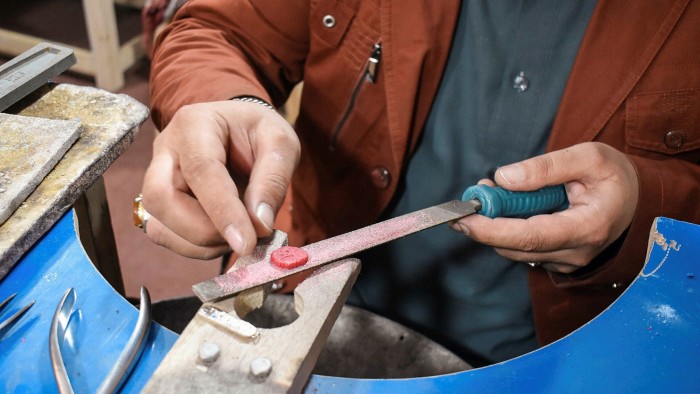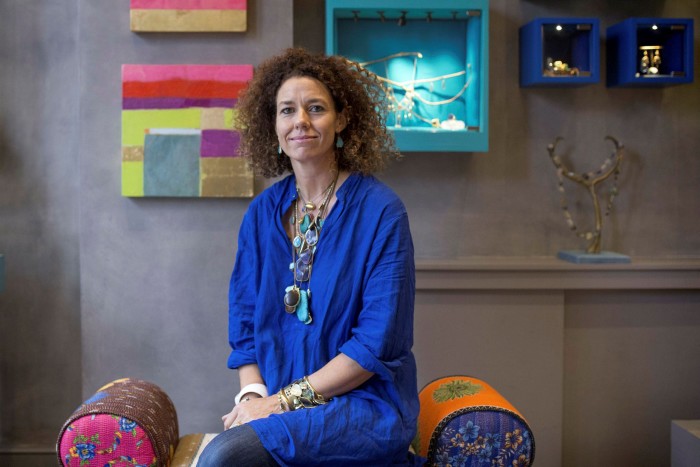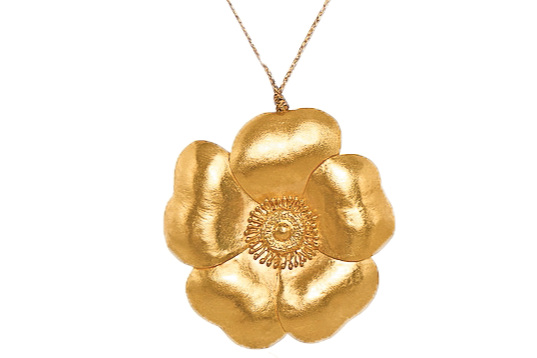Taliban takeover leaves Afghan jewellers in limbo

Roula Khalaf, Editor of the FT, selects her favourite stories in this weekly newsletter.
The fall of Afghanistan to the Taliban has plunged the country into an economic and humanitarian crisis and left citizens in fear of a return to the repressive regime of 20 years ago. And among the many groups in the country that have reason to feel particularly vulnerable are Afghanistan’s artisans — including its jewellers.
Over the past decade or so, not-for-profit organisations such as Future Brilliance and Turquoise Mountain have been proud to publicise the impact their educational programmes have had in training a new generation of jewellers, particularly women, as well as reclaiming lost traditions, providing employment and inspiring entrepreneurship.
Now, both organisations have applied a media blackout alongside other international development groups, uncertain if and how they will be allowed to continue their work in the country.
“It is difficult to predict how the situation is going to play out,” says Edmund Le Brun, co-founder of Ishkar, a social enterprise company that has created an online marketplace for artisans in war-torn countries, including Afghanistan.
“It is different for different crafts. Carpets are mostly woven by women in rural areas of Afghanistan. We make carpets in Faryab, which was taken by the Taliban [more than] two months ago and production hasn’t been affected. But what remains to be seen is things like jewellery, which [is] made by our female jewellers based in Kabul and there is uncertainty whether they can work and what their working conditions will be like under the Taliban.”
Le Brun believes that many of the jewellers Ishkar works with, who are typically “young, urban and educated”, will try to leave the country, although not all will succeed. In the meantime, he says, it is important to keep supporting the country’s artisans by buying their products. “One of the most overwhelming feelings that Afghans have is one of abandonment,” he says. “They were promised so much and now they have been left. All the progress of the past 20 years is going to be surrendered and buying high quality luxe items is a powerful way of showing we haven’t forgotten them. It’s a symbolic act.”
Ishkar has a link on its website where donations can be made to support medical care in the country. Most of the big organisations involved with supporting Afghan jewellers and other artisans are also appealing for donations to support wider humanitarian efforts in the country, as well as to help support the workers who rely on them.

One fundraising initiative, Jewellers for Afghanistan, involves 25 British independent jewellers who have each donated a piece of jewellery as part of an online auction to raise funds for the Afghanistan-based charity Women for Afghan Women. Online bidding runs until Monday October 4.
One of the jewellers taking part is Pippa Small, who has a long connection with Afghanistan, where she has a workshop that employs 25 people producing some of her jewellery. “There are so many who don’t want to leave,” she says. “They live in such tight-knit communities. They just want to keep their jobs. A lot of people we work with were refugees last time round in Pakistan and tended to set up workshops there, so the fact that they were able to come home and work in Afghanistan was a huge thing already.”
In particular, she feels for the women she works with. “Over the course of the 13 or so years I have been working there, women have started joining the workshop. At first, tentatively and shyly and kept separate. And to watch them thrive and [to see] their confidence grow was really something beautiful. Especially the younger generation coming up who had such ambition and such determination to make a name for themselves; [from] gemstone cutting and designing to goldsmithing, they wanted their voices heard. You could really feel that. It is extraordinary . . . that they may be silenced at this point.”

Things looked very different in 2008 when the country’s Ministry of Industry and Commerce published a policy document laying out plans to boost Afghanistan’s precious stones and jewellery exports. It had identified their potential to “generate inclusive employment for women, youth and people in rural areas”.
It also acknowledged these industries’ deep roots in Afghan culture and how, in recent years, the use of ecommerce has offered the world access to the country’s “hidden gems, and unique items of Afghan jewellery”.
It is not surprising that countries such as Afghanistan have turned their attention in recent years to the untapped potential of its artisan sector. According to the Aspen Institute, the sector is the second-largest employer in the developing world, behind agriculture, worth about $32bn a year. “Millions of people, particularly women, in developing countries around the globe are key drivers of the artisan economy,” it notes.
However, no significant initiatives seem to have flowed from the Afghan government’s plans — something that comes as no surprise to Thomas Barfield, a professor of social anthropology and an expert on Afghanistan at Boston University. “The Afghan government over the past 20 years never took the lead on these tasks,” he says. “If foreigners wanted to do it, that was great, but that was one of the defects of the government: it was remarkably passive in terms of its economic development. It never put in any of its own money to speak of or, if it did, if money was allocated, it never got spent.”
It is still unclear what the Taliban policy will be towards jewellery or under what circumstances women will be allowed to continue making it. Small says her understanding of the Taliban’s previous regime was that “as jewellery was not allowed to be worn, there was little opportunity to make it”. Nevertheless, Le Brun believes the Taliban “is unlikely to want to constrain jewellery making too much or discourage trade”.
In the meantime, the production manager at Small’s workshop in Kabul has a message for the world: “Our workshop is open, the artisans are working and need this work to support their families. Please support them and Afghan businesses.”
Comments